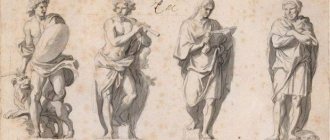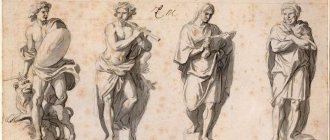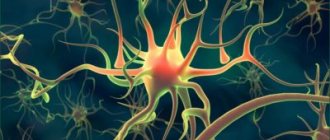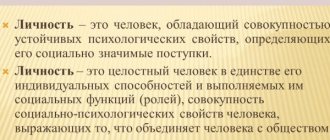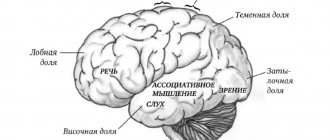The basis of personality
Temperament is a certain biological basis on which personality is built. Temperament determines the mechanisms of psychological activity and the ability to socially adapt. On its basis, social properties of the psyche are formed. From a physiological point of view, temperament is a type of higher nervous activity.
Scientists consider Hippocrates to be the father of the theory of human temperament. Later, the philosopher and physician Claudius Galen developed this theory and became the author of the scientific treatise “Correct Measure.” This work describes four types of temperament according to basic biological substances. Blood plays a key role in the formation of the sanguine type. For a choleric person, the main substance is bile. The phlegmatic type develops under the strong influence of phlegm. And melancholic in a person is determined by the so-called “black bile”.
No type of temperament is found in its pure form. Every person has a basic temperament, developing or suppressing it depending on circumstances. In different situations, the same person is capable of exhibiting traits of all four types.
The theory of I. P. Pavlov
The fact that the course of mental processes and the behavior of an individual depends on the work of the nervous system, which plays a dominant role in the body, has been known for a long time. But the theory of the connection between temperament types and certain general properties of nervous processes was first proposed by the Russian physiologist I. P. Pavlov. It was subsequently developed by his followers.
In the understanding of Academician Pavlov, the type of nervous system is innate and is least subject to any changes under the influence of upbringing or environment. The properties of the nervous system, according to his ideas, form the physiological basis for temperament, which is a mental manifestation of the general type of the nervous system. Pavlov's subsequent studies on animals made it possible to identify types of nervous systems, which he proposed to extend to humans as well.
Properties of temperament
Each type of temperament is determined by the presence of specific properties, namely:
Extraversion and introversion
These qualities are based on emotional reactions, on the speed of volitional actions.
Activity and passivity
These properties show a person’s reaction to negative events and difficulties, and also determine the degree of his endurance, perseverance and determination.
Sensitivity
It manifests itself in the strength of the influence of external stimuli that force the psyche to react in one way or another. Different people react to the same event in completely different ways.
Reactivity
This term refers to an involuntary reaction of the psyche to irritating factors (they can be both external and internal).
Plasticity and rigidity
These qualities show a person’s ability to adapt to the environment and adapt to new circumstances.
Reactive Activity Rate
This property determines how quickly the psyche reacts to external stimuli.
Emotional excitability
Using this property, you can determine how much a person is able to control his emotions, speech and mental reactions.
Choleric - who is it?
- A choleric person has a very strong, but extremely unbalanced nervous system (i.e., excitement predominates in his brain activity). This suggests that a person with this type of temperament is extremely emotional and has a strong reaction to external stimuli (sometimes he can be confused with a sociopath).
- However, the sensitivity of a choleric person is extremely low, so he does not assess external reality very well (does not cut the chip). At the same time, his speed of nervous processes is even higher than that of the sanguine person described above, so he is extremely fast and extremely sharp.
- A choleric person is again an extrovert, that is, external stimuli (communication, interaction) are much more important to him than his internal state (that is, he never engages in self-examination).
- This type of people always strives to realize their impulses, including in their expression, which, by the way, is much more pronounced than that of a sanguine person. That is, a sanguine person has smoother and less sweeping gestures, but a choleric person always waves his arms and looks in all directions. His voice is also more emotionally rich, as well as his facial expressions.
- The choleric person is very reactive (has a quick response to external stimuli), and therefore his attention is quite easy to attract, and his reaction to ordinary stimuli is sometimes also very exaggerated. For example, he may take a common remark with hostility or lose his temper over any trifle.
- A choleric person is also, in principle, socially adaptive, although to a lesser extent than a sanguine person, because the choleric person’s reactions to others sometimes seem not entirely adequate.
- Choleric people have a weak “ego”, that is, they have great difficulty restraining their emotions and impulses. Such people are very emotional and they often make decisions on an emotional basis (i.e., irrational thinking predominates in them).
- For such people, working in the media or show business, for example, is good because... they are good actors and can easily get into character. They are also characterized by such professions as musicians or artists.
- Cholerics for the most part are not trainable. They mainly grasp only superficial specific knowledge, but not the general theory, so it is difficult to talk about professionalism and depth of knowledge here. Although such people can learn specific practical skills well and be specialists in this regard.
- Cholerics have unique relationships with people. Usually, those around you get tired of these causeless and inadequate emotional reactions. For choleric people, relationships are always emotionally oversaturated. But in general, a choleric person can be perceived as a very good friend. He can become quite attached to a person, to the point of wild jealousy and deep resentment.
- Love relationships among choleric people are also passionate, but short. And basically such relationships are accompanied by a certain drive and extreme. The most optimal pair is a choleric person and a sanguine person. But phlegmatic and melancholic people cannot stand people with this type of temperament.
- Cholerics are often credited with outstanding leadership qualities, but everything is not so simple here. Yes, Zhirinovsky can be called a leader, but not in life, but in public. That is, it is not a fact that if in life you communicate with a choleric person, he will necessarily be a leader among you.
- For example, in most sanguine-choleric couples, the leader most often becomes the sanguine person, because he, as a rule, is smarter and more cunning. But the choleric person is quite emotional and simply follows the lead of the sanguine person.
- It is also worth saying that emotional (irrational) decisions are not particularly acceptable in modern society. Therefore, people, as a rule, adequately evaluate their leader and understand that he is carrying some kind of blizzard and that he is overwhelmed by emotions, not thoughts.
- A choleric person usually reacts emotionally to conflicts, which is quite expected. He is unlikely to use communication to solve problems, but will simply immediately use his fists or start yelling (depending on the type). However, people of this type are also cowardly, so if you intimidate them, they will quickly back down.
How is temperament different from character?
A person's temperament should not be identified with his character. The first term includes a set of genetic characteristics of the psyche. Temperament is formed in utero, it cannot be changed, but can only be superficially corrected by working on oneself and correctly setting life priorities.
Character is formed throughout life, changing in one direction or another. Interacting in the social sphere, individuals exchange behavioral and mental experiences, influence others and are subconsciously influenced by others.
How to determine character by appearance?
General character traits can also be determined by the appearance of people: men and women. To do this, pay attention to the following:
- Manner of dressing . It can express demonstrativeness, a desire to stand out, or, conversely, shyness and indecisiveness.
- Accessories . If there are too many of them, then this may indicate expressiveness and vanity. Their absence can express the straightforwardness and simplicity of a person.
- Gestures and facial expressions . Active gestures are characteristic of expressive people. Meager and hesitant gestures speak of a person’s uncertainty and tightness.
In psychology, there are many classifications that describe a person’s temperament and character. But it is rare to find pure types; usually a person is on the verge of several.
Determining a person's character by appearance:
Who is who?
A brief description of each temperament, based on the nervous activity of its owner:
Sanguine - strong, balanced, agile;
Choleric - strong, unbalanced, mobile;
Phlegmatic - strong, balanced, inert;
Melancholic - weak, unbalanced, inactive.
A person’s belonging to one of the four temperaments can be determined situationally - by his reaction to an obstacle that arises in his path: a choleric person sweeps him away; the sanguine person bypasses; a phlegmatic person often doesn’t even notice; the melancholic person stops before an obstacle.
Sanguine person - positive and negative qualities, suitable professions and activities
This is one of the most pleasant psychotypes. Unlike choleric people, they are emotionally stable.
Negative sides:
- Superficiality
- Haste
- Reluctance to delve into the depth of the situation
- Frivolous
- They like to brag
- No sense of proportion
Positive sides:
- Leaders. They often take on the task of organizing some kind of community and succeed in this matter.
- Stress-resistant and harmonious. They try not to react painfully even to the most unpleasant situations. It's hard to piss them off.
- Rarely suffer from mental illness. Due to their stable psyche, there are no patients among them in mental hospitals.
- Optimistic. Even in the most difficult situations they try to find something positive.
Recommended professions:
- Administrator
- Teacher
- Human Resources Manager
- Economist
- Journalist
- Lawyer
Sanguine person - positive and negative qualities, suitable professions and activities
Characteristics of a melancholic person
Strengths:
- Deep and thoughtful
- Analytic mind
- Serious and focused
- Gifted
- Talented and creative
- Artistic and musical
- Ability for philosophy or poetry
- Connoisseur of beauty
- Sensitive to others
- Selfless
- Conscientious
- Idealist
Weak sides:
- Remembers negative moments
- Tendency to mood swings and depression
- Likes to be offended
- Head in the clouds
- Low self-esteem
- Selectively listens
- Concentrated on himself
- Closed
- Often feels guilty
- Prone to persecution mania
- Prone to hypochondria
Melancholic at work
- Sticks to schedule
- Perfectionist, sets high standards
- Pays attention to details
- Persistent and thorough
- Organized
- Careful
- Economical
- Sees problems
- Finds non-standard solutions
- Loves graphs and lists
Most suitable professions
and in the fields of: research, arts, science, administration, social work
Melancholic friend
- Makes friends with caution
- Prefers to stay in the shadows
- Tries not to attract attention to himself
- Devoted and faithful
- Ready to listen to complaints
- Can solve other people's problems
- Concerned about other people
- Looking for the perfect partner
Note to the manager
A phlegmatic person works well in conditions of monotony and monotony, where endurance, patience and perseverance are needed. Usually he switches slowly from one job to another, so if he has already taken on one task, he will see it through to the end. He needs to give instructions accurately and concisely, preferably in writing, so that he can think about and analyze the new information. Under no circumstances should you entrust a person of this type of temperament with a job that requires initiative or prolonged communication with people! Working with clients is simply contraindicated for them.
Choleric colleague
A choleric person is a very impulsive and lively person who reacts emotionally to everything that happens. He is passionate about his work, can overcome significant difficulties and never gives up. If something fails to be done the first time, the choleric person will solve the problem again and again until he brings the matter to a victorious conclusion. He must always win - this is his main rule.
Choleric loves various changes, and, oddly enough, both positive and not so positive. The increased emotionality of choleric people leads to the fact that all their thoughts are literally “written on their faces” - you can easily determine when a choleric person is interested, when he is bored or irritated.
By nature, choleric people are sociable and easily make contact.
They like to subjugate and control those around them; they see everyone as rivals. Excessive straightforwardness, hot temper, harshness and intolerance sometimes make it difficult for a choleric person to stay in a team: he cannot always stop in time, which offends others, without meaning to. The choleric person actively gets down to work, plans a lot, but quickly burns out and becomes not only useless, but also negatively inclined towards the task, which can cause bewilderment and dissatisfaction among colleagues. Advice to colleagues: If you work with a choleric person, do not react to his outbursts and do not try to shout down, do not argue. Put an interested smile on your face, speak in a friendly tone, you can even make an inoffensive joke. Show confidence. This will puzzle the choleric and at the same time calm him down.
Phlegmatic - positive and negative qualities, suitable professions and activities
People with this psychotype are the golden mean between other temperaments. They are balanced, calm and positive.
Positive sides:
- Workaholics. These are the worker bees of society, the best workers
- Stress-resistant. It's very difficult to piss them off
- Patient. They endure for a long time not because it is necessary, but because everything suits them
- Purposeful. They methodically carry out their work and bring it to completion.
Negative sides:
- They don't like change. For them, moving is a natural disaster.
- It is difficult to find a common language with people. They are generally not very sociable by nature.
- Inhibited. They are often lazy and do not strive for anything. Complete lack of initiative
Recommended professions:
- Engineer
- Vet
- System Administrator
- Dispatcher
- Laboratory assistant
- Jeweler
Phlegmatic - positive and negative qualities, suitable professions and activities
Melancholic - positive and negative qualities, suitable professions and activities
Quite a complex psychotype with unstable reactions.
Positive sides:
- Gullible
- Creative personalities
- Prone to compassion
- Friendly
- They know how to listen
- Loyal to your soulmate
- Good friends
Negative sides:
- Prone to depression
- Pessimistic
- Prone to criticism
- They don’t know how to communicate with people and don’t want to
- Avoid noisy companies
Recommended professions:
- System Administrator
- Programmer
- Librarian
- Editor
Melancholic - positive and negative qualities, suitable professions and activities



